Greetings from Uganda! We’re way past the halfway of our trip. As an experience Uganda has been very all surrounded experience that I can’t really analyze it very deeply in one blog post. We’ve experienced many different things and we still have plenty of those left before coming back to Finland. Some of the experiences have been amazing, incredible and something we only get to experience once in a lifetime. Some experiences have been very rough and they require a lot of processing even after returning to Finland. Whenever I talk to someone in Finland and they ask what’s going on in Uganda, the usual answer is nothing much, just the normal every day life. That is why I’ll be mostly focusing on our every day life in here instead of the adventures we’ve had.
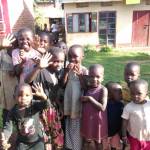
After our orientation week all 11 of us spent four weeks in Mpigi. I think Fanny already covered that in her blog post, so I’ll be telling what’s been happening ever since. Four of us spent our holiday week in Zanzibar (which I can absolutely recommend to anyone, it was absolutely gorgeous and I don’t think I’ve ever been that relaxed), meanwhile others were exploring Uganda through safari, gorilla tracking and visiting Pygmi-village (yes I am serious). After our holiday some of us, me included, came to Kampala. We are living in a small hostel called La’Villa. I’ve been working at China-Uganda Friendship Hospital Naguru. Naguru is a bigger, public hospital. I have been working in antenatal with pregnant women, in postnatal (vaccinating, family planning, postnatal ward, NICU) and now in labour ward. Some days in antenatal there were over 150 mothers a day and at maternity ward there are many people on the same bed and the floors are full of people sleeping on mattresses. The hallways are full of people; pregnant women, accident victims, emergency gyne patients, family members and hospital staff. I think it’s fair to say that maternity as a medical area is a big part of the public health care here.
There are no privacy at the hospitals. At the labour ward in Naguru there are three beds for deliveries and in between there are not even curtains. They suture with hands, sometimes the midwives don’t even use instruments. They are used to cutting episiotomy with a razer blade and without local anesthetics. We see a lot of things here that we would never have seen in Finland. Like our friend Peter always says, “it’s not right, it’s not wrong, it’s just different.” We have witnessed a lot of nurses slapping, yelling or laughing at the patients. The nurses seem to have the power here over the patients and they use it. Ofcourse there are those lovely nurses who really treat the patients nicely as well. Because we witness a lot of rough things here, we can’t take it personally. If we did and didn’t know how to process these things we see, hear and experience, we wouldn’t be able to last the three months in here. Luckily there are those wonderful, positive things every day that keep us happy most of the time. This has been an incredible experience and I gotta tell you, you learn a lot about yourself, your own values and you don’t come back the same person you were when you first came here. Our group has also been absolutely amazing. There are no words to describe Africa and it totally has stolen our hearts.

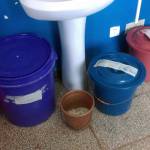
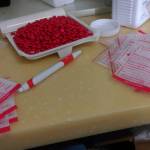
Our normal day starts with the breakfast. Either we eat at the hostel (bred, an omelette and tea) or we make porrige and coffee. We made this possible by buying water heaters. At 7:30 am the university ride comes to pick us up and takes us to the hospital. But then again, we live in African time so 7:30 am can actually mean 7:30 am or 9 am. “In Africa we have time, we don’t have watches”. One morning it was raining and they just let us know that they’ll pick us up when the rain stops. Even the nurses first came to work once the rain had stopped.
At work we usually have our lunch between 12-13 o’clock. Our lunch break lasts an hour. We either have the local food for lunch, or we buy banana, yogurt or samosa (this local dough triangle with beans or meet inside of it). Our day ends between 14-16 o’clock, depending on where we happen to work. We come home with the university ride (which comes when it comes), with boda bodas (local motorcycles which is very dangerous with the traffics and without a helmet on) or with an Uber-taxi which has been the safest and cheapest way of getting home on time. When it’s dinner time, we mostly eat in our rooms noodles with something. If we’re in the mood for something else, we eat at the hostel or we go somewhere else to eat. We don’t do much in the evenings. We go to the store, buy water or chill together, sometimes with our local friends.
A part of our normal life is also dealing with the Ugandan shillings. One euro is about 3500 shillings. Mostly I don’t do the calculations in my head anymore. After our trip to Zanzibar we had to calculate Tanzanian shillings to euros and those to Ugandan shillings. Sometimes it can be a bit tricky. We’ve also learned how to bargain (but most of us are still very bad at it). The Mzungu-prices are about double to what the locals pay, so you need to know how to get the price down.
I’ve also realized how much we take things for granted in Finland. For example, shower and tap water. In here, a shower means washing ourselves under a small, cold water trip under the shower tap. We carry our water from the stores. We like to buy 18 liter bottles, then pour that one into 5 liter bottles and from those again into 1,5 liter bottles. If we buy cold water, it’s not gonna stay cold for a long time. We do our laundry by hand, mostly in the cold water. We don’t really go anywhere alone and walking in the dark is not safe nor much fun. We haven’t been much sick, but lately seems like we are having more stomach problems than we did before.
Now it’s starting to be colder here. The finnish storms are nothing compared to the ones we have here. We love to watch the lightnings and the storms.
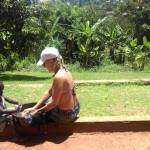
The Ugandan traffic is veeeery trafficy. You go where you can pass. I will never complain about the small bumps on the road in Finland ever again. The Ugandan people are very religious and because there are a lot of muslims in here, we hear a lot of prayer calls. There are a lot of chickens and goats walking free on the streets. We see the poverty everywhere. There are a lot of slum areas and some of us have been able to go and actually do homevisits. We see a lot of people begging for money and selling things on the roads and on the streets. But then there are also those veeery rich people and the contrast is huge. Corruption is also a big problem here.
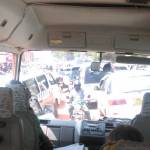
Most of the Ugandan food is carbs. They eat fish, some chicken and meat. Matoke and Ugali are very common food here and you can get them anywhere. Matoke is a mash made of bananas and Ugali is a mash made of maize flower. Chapati-bread is amazingly good and also those samosas I was writing about earlier. A common street food is a Rolex, which is an omelette wrapped in a chapati. They make this amazing peanut sauce in here as well. You can buy chips from almost anywhere. Cabbage salad and spinach salad are very common as well as peas and beans. We absolutely love the fruits here and I don’t know how we’ll get used to eating the fruits from Finnish stores again.
Part of our every day life in here is dealing with the mosquitos. We sleep under a mosquito net. We (well mostly me) scratch when it itches. There are also other bugs in here. But luckily these mosquitos in here don’t make the noise the ones in Finland do, so it’s not nearly as annoying. And the bites itch for a while but then they stop itching very quickly.

The Ugandan people are amazing. They are so nice, friendly and open minded. It doesn’t matter how poor they are, if you are a guest they give you the last bite of everything they have. The Ugandan children are so happy and even they are very open minded. Sometimes the communication is tricky. Some people speak English with an unclear accent and some mumble a lot. I only dare to ask “what?” so many times. Because sometimes it’s hard for us to understand what Ugandan people are saying and for them to understand our accent, we’ve learned to communicate with just different noises. We’ve also learned the most important words and phrases in Luganda. For me, that mostly means words and phrases that get me through delivery with a mother who doesn’t speak English. Our English has also gotten way worse since we’ve been here, so it might take some work after coming back to Finland to get our English back. We find ourselves using phrases like “even me”, “we move now by the way” as a result of dealing with certain Ugandan people.
So this is what our every day life is like for us. I am sure we will have the biggest culture shock when we return to Finland in a few weeks but until then we are trying to enjoy the last weeks in here.

-Elsa


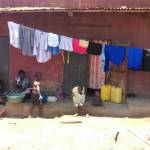
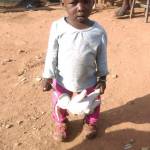
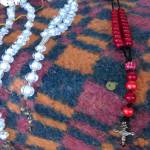
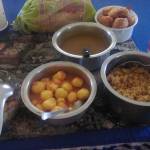
Comments